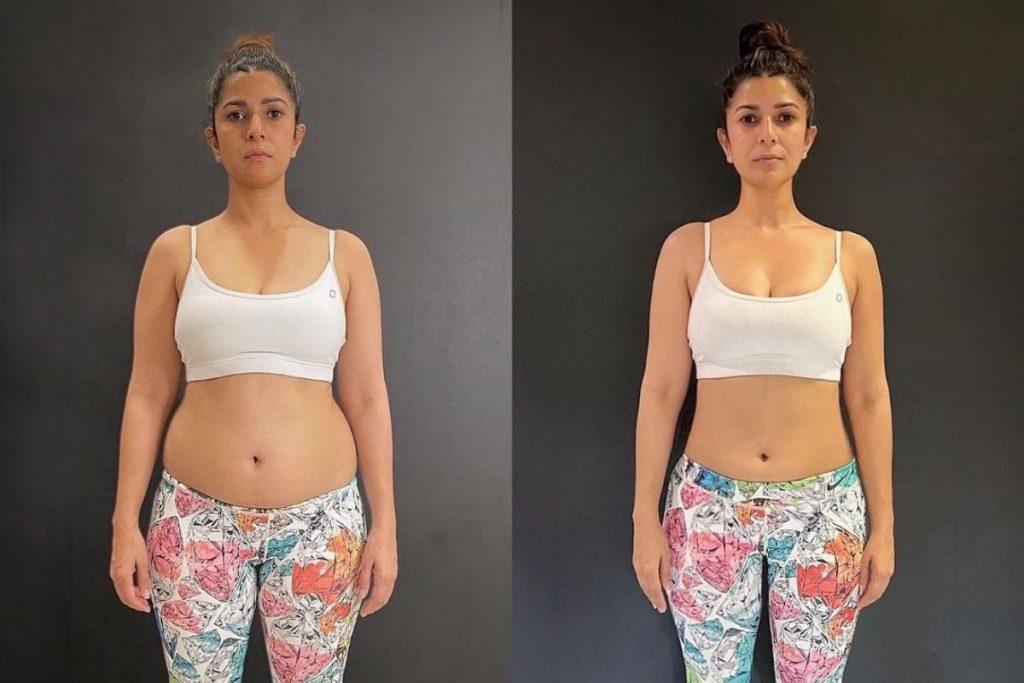New Delhi: Nimrat Kaur’s role as Bimla Devi, the wife of Abhishek Bachchan aka Ganga Ram Chaudhary in Dasvi grabbed eyeballs. Apart from distinctly carrying out the attitude and image of Bimala Devi, Nimrat Kaur had to undergo a major weight transformation to look perfect craving out the actuality of the role. She had to gain 15 kgs for the role of Bimla Devi.
Unknowingly, netizens trolled her for her weight gain and now the time has come to respond to the trollers. She took to social media and wrote a lengthy post while sharing a collage photo to show then and now photos of her. Sharing the post she wrote, “Weigh on it…Swipe left for my thousand words this picture won’t speak.” Her note accompanying the collage stated how she was trolled after weight gain.
Starting the note, Nimrat Kaur stated, “In the age of heightened expectations regarding what we ‘should’ look like, at all times – gender, age and profession no bar, I’m sharing a small chapter from my life that brought with its learnings that shall last a lifetime. Bear with me, as unfortunately, there isn’t a ‘bite sized’ version of this 10-month long journey.”
Talking about the weight gain for Dasvi she wrote, “Born with what’s typically categorised a small to a medium body type, with Dasvi came the requirement for me to size ‘up’. The idea being to be as unrecognisable and physically as dissimilar from ‘being Nimrat’ as possible. There was no target number in mind, but by the end of trying to achieve the desired visual impact, I was a touch above 15 kilos from my usual body weight. Initially, I was rather petrified of an unseen reality I was going to have to own and embrace. But as I steadily and lovingly along with the support and encouragement of my loved ones around me began right conversations with myself, I began relishing the process of becoming Bimla.”
Check out Nimrat Kaur’s post:
“This is about what I began to notice along the way. Ever so often, watching me eat high calorie meals already being a few sizes bigger, some people around me felt they had the right to comment on what they thought I was doing wrong. It would be a snide remark, an uncalled for joke or simply an unsolicited piece of advice on what I should be eating instead of a dessert I was enjoying very much. This voyeuristic license and entitled permission is what came to the forefront,” she added.
Nimrat also talked about the trolls saying, “On purpose, not always would I declare the ‘why’ behind what I was looking like or consuming. But always did I observe the ease with which people made my ‘larger than usual’ body and/or meal their business. I could’ve been unwell, under medication, hormonally battling something, or quite simply very happy to eat and be me whatever size that was.”
The Lunchbox actress is back to her body and talking about the weight loss she wrote, “Having completed the circle of this journey and back to physically being me, today in the truest sense I’ve learnt how not to let an outside perspective decide my relationship with me. I share this to add to the larger dialogue of how we could all do with more mindfulness, sensitivity and empathy. Especially towards those who don’t fit in the myopic, pigeonhole prototype of what the ‘norm’ expect them to be – whether it’s being too dark, too thin, too short, too fat or too any of these berating measuring scales from the lens of the conditioning they come from. Recognise that everything they say and observe is a reflection of a mindset. Not who they’re beholding.”
“Be kind. Be sensitive. Be graceful. Don’t make someone’s day worse if you can’t make it better. Be responsible. Make only your mind and body your business. No one else’s,” concluded Nimrat Kaur.
Celebrities flooded the comment section with encouragement. Parineeti Chopra wrote, “Love you my girlll,” while Vaani Kapoor and Diana Penty left clapping emojis in the comment section. I feel it! Generally, all the negativity and unwanted nastiness comes from people who are doing nothing in life and still somehow own a cell phone and money to recharge it. People struggling to make a living or make a better living are generally appreciative of hard-work the kind you have done!” wrote Abhinav Shukla.

